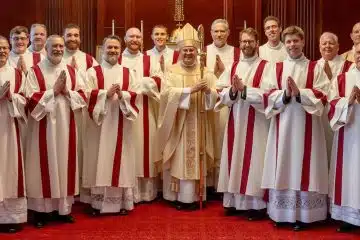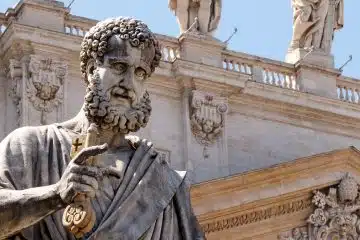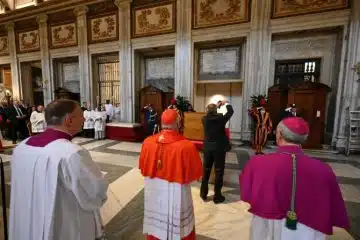Sunday Scripture: Blessed is he who comes in the name of the Lord
Wednesday, March 24, 2010
By Sister Betty J. Lillie, S.C.
Palm Sunday of the Lord’s Passion: Procession Luke 19:28-40; Isaiah 50:4-7; Psalm 22:8-9, 17-18, 19-20, 23-24; Philippians 2:6-11; Luke 22:14-23:56
The perimeters of our Lukan readings for this Palm Sunday include important events for our Holy Week reflections. There is the Last Supper that Jesus had with His apostles (Luke 22:14) that became the Lord’s Supper (Luke 22:19), in which He gave them His body and blood as a continuing expression of unity with Him in His death and in His victory.
The account continues with instructions about servant ministry rather than domination over others (Luke 22:24-30). Then follows the apostles’ preparation for preaching the Gospel in face of hostility. That hostility surfaces in the text in the betrayal and trial of Jesus that eventuate into His death and burial.
Those very heavy thoughts may seem to overshadow everything else in the scenario. Life itself gives us opportunity to think about suffering.
Let us place some emphasis here, though, on the joyous aspect of Jesus’ Palm Sunday entry into Jerusalem at the beginning of this solemn week, and the glory of His resurrection at the end of the week. Taken all together, the sequence of Jesus’ redemptive acts presents thoughts of awe and wonder about the love of the Father for humankind, and the obedient love of the Son for those whom He calls to be His own forever.
There is a beautiful eucharistic chant motet that puts it all together for us and is translated something like this: “O sacred banquet in which Christ is received, the memory of His passion is renewed, the mind is filled with grace and a pledge of future glory is given to us.” That says it all. Gratitude for God’s wonderful gifts puts us in line with the celebration of our redemption and our union with our Lord and Savior.
If, in our mind’s eye, we step aside for a moment to John’s story of the Last Supper, we remember that he tells us that Jesus washed the apostles’ feet. Jesus made it clear to Peter that the washing ritual that He was doing would make Peter “part with Him” (John 13:8). Could we think as well of our own baptism as a washing ritual by which we are incorporated into Christ and become members of His mystical body? And could we move a step further to the gift of baptism that the new members of the church receive at the Easter Vigil, and rejoice and celebrate the mighty works of God for all of us?
In the narrative in Jesus’ triumphal entry into Jerusalem we saw that the whole multitude of the disciples rejoiced and praised God with loud voices for all the mighty works that they had seen. “Blessed is the King who comes in the name of the Lord! Peace in heaven and glory in the highest” (Luke 19:37-38).
In the narrative of the empty tomb the two men (perhaps angels) said to the women, “Why do you seek the living among the dead?” Other ancient authorities add, “He is not here, but has risen.” What Jesus had told them was coming true in their life experience, and they would soon come to rejoice in the visible presence of the Lord. So we, too, can rejoice and celebrate God’s mighty works for us.
With the psalmist we can say, “You who fear the Lord, praise Him! Glorify Him and stand in awe of Him” (Psalm 22:23).
Sister Betty Jane is a faculty member at the Athenaeum of Ohio.









